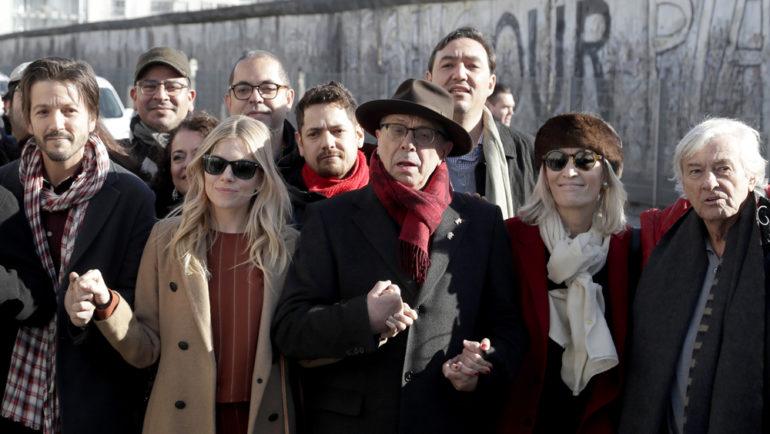For Berlin’s Dieter Kosslick, His Private Life Is Political
By Ed Meza
LOS ANGELES (Variety.com) – Established just six years after Germany’s surrender to the Allied powers and in the midst of the Cold War, the Berlin Film Festival was born with a stark political streak that has only intensified over time, and under Dieter Kosslick it has not only reflected the zeitgeist but also the festival director’s world view.
Kosslick is being honored at the with Variety‘s Achievement in International Film Award.
While the Berlinale began as a “glamour event in the destroyed city in order to invite international stars like Gina Lollobrigida,” the time and place of its founding nevertheless made the festival political, Kosslick stresses.
“This was the city at the front between communism and capitalism. Yet since its early days, the ideology of the Berlinale has always been one of understanding between peoples, and it has remained so,” he says. Its political character deepened over the years as it increasingly contributed “to the understanding and exchange of ideas between East and West.”
Kosslick’s tenure in Berlin began just four months before the Sept. 11, 2001, attacks; the U.S. invasion of Afghanistan soon followed, and in 2003, the U.S. led a coalition that invaded Iraq.
“Automatically in 2002, 2003, every red carpet became political,” he says. “It’s become more so today. The programs of cultural events around the world naturally have to reflect reality. It’s not just the Berlinale anymore. All festivals have gone from being glamour shows to political events.”
Indeed, in 2003 some 400,000 people gathered at the festival to protest the U.S. invasion of Iraq as Michael Winterbottom’s “In This World,” about two young Afghani refugees on a perilous journey, won the Golden Bear.
Kosslick, who describes himself as “a very political person — I’m post-’68,” is involved on a personal level as a member of Flüchtlingspaten, a refugee- sponsorship organization.
In recent years, the Berlinale has worked with such groups to assist refugees by offering internships at the festival, raising money and inviting displaced people to see films. The festival likewise partners with Amnesty Intl. on a special award for films that deal with the issue of human rights.
Kosslick introduced a number of sidebars and initiatives that further sharpened the fest’s political profile.
“That we have Culinary Cinema at the Berlinale has less to do with the fact that we like to eat,” he says. “Yes, we like to eat and eat well. Everyone should enjoy eating well and not that junk food crap. But today it’s political, because it’s all about how the agriculture industry is organized. What are we doing in Africa? Land grabbing — to supply the Chinese and Europeans with food. We are also exporting subsidized poultry to Africa. It makes no sense. It takes away the possibility for the native people to create their own food infrastructure. The result: people will flee their land because of poverty. Then you create a refugee problem.”
The Berlinale’s environmental certification further illustrates its political engagement. “We are conscientious about the carbon footprint of our travel. We changed our catering system. Today it is much more understandable, but when we stopped serving meat here many years ago people flipped. I did it because I’m vegetarian, but I’m vegetarian for a reason, it’s not just a matter of taste. The meat industry is filthy and scandalous. It’s responsible for immense CO2 emissions; it’s destroying rain forests and mistreating animals.
“If we have been successful in the past 18 years, it’s partly due to the fact that people see that we want something more than just to show films. And that is converging more and more with the mainstream. It’s unbelievable: In 10 years Berlin has become the vegan and vegetarian capital of Europe.”
Far-reaching social and political issues will again be showcased this year, notably the sexual abuse of children by priests and the deafening silence of the Catholic Church — the subject of François Ozon’s competition screener “By the Grace of God.”
The 40th anniversary of the Panorama sidebar will also have plenty to offer. “It’s 40 years of fighting for human rights,” Kosslick says. “The fight for gender acceptance is a fight for a human right because everyone should and must live the way they want to and not the way the church and other religious organizations or political parties demand. That will be a topic at this year’s Berlinale. Private life is political.”

